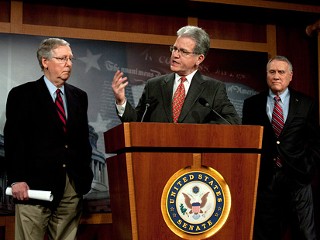
WASHINGTON — Democrats approved the second of three motions to close off debate on their health bill Tuesday and moved closer to passage on Christmas Eve, while Republicans highlighted their contention that the bill’s requirement for buying insurance is unconstitutional.
All 58 Democrats and two independents supported the motion to limit the debate, which is now in its fourth week, while 39 Republicans were against it.
The final motion to end debate is expected to win approval Wednesday afternoon, clearing the way for senators to vote on the bill itself at 8 a.m. Thursday, which is Christmas Eve. Immediately after that, the Senate is also planning to vote on House-passed legislation increasing the government’s borrowing authority.
Convening on Christmas Eve would mark the 25th straight day of debate, bringing the Senate just short of the record for most consecutive days in session. That was set in the winter of 1917 in the run-up to U.S. entry into World War I, when the chamber met for 26 consecutive days.
“The finish line is in sight, said Senate Finance Committee Chairman Max Baucus, the Montana Democrat who is a chief architect of the Senate bill. “Now we know with certainty that we have the will to cross it.”
To meet a pre-Christmas deadline for action set by President Barack Obama, Senate Majority Leader Harry Reid (D., Nev.) has pushed his colleagues — even 92-year-old Sen. Robert Byrd, the West Virgina Democrat — through a grueling schedule this week, including votes at 1 a.m. Monday and 7 a.m. Tuesday.
With Senate Democrats showing their determination to move in lockstep, Republicans — who contend that the sweeping bill would impose unreasonable burdens on taxpayers and businesses — said they would continue fighting even after the House and Senate begin negotiations on a compromise version in January.
“This debate is not over,” said Senate Minority Leader Mitch McConnell (R., Ky.). “The American people are still going to have another month to weigh in.”
Republicans are forcing the Senate to vote Wednesday on whether the Democrat-backed bill is unconstitutional. Sen. John Ensign (R., Nev.) raised a point of order Tuesday against the bill, arguing that the Constitution doesn’t give Congress latitude to force Americans to buy health coverage, as both the House and Senate bills do.
“What’s next?” Mr. Ensign said. “Will we consider legislation in the future requiring every American to buy a car? Will we consider legislation in the future requiring every American to buy a house?”
Mr. Ensign isn’t expected to succeed. But the effort dramatizes a criticism raised by Republicans and conservative activists. Under the Senate and House bills, Americans who don’t receive health coverage through their employers must buy insurance if they can afford it.
The “individual mandate” is part of broader legislation designed to expand health-insurance coverage to tens of millions of Americans. The bill offers tax subsidies to purchase insurance and widens eligibility for Medicaid, the federal-state program that provides health insurance to the poor.
Conservative critics contend that the provision violates the Constitution’s “takings clause,” which says “private property [cannot] be taken for public use, without just compensation.”
Democrats counter that the mandate is necessary to make the planned overhaul of the health-care system work, and ensure that as many people as possible participate in the system. Under the Senate bill, individuals who don’t purchase coverage would face a financial penalty up to $750.
Democrats say the courts have given Congress wide authority to impose rules under its powers to regulate interstate commerce.
“We feel very sound in our position,” Mr. Reid said.